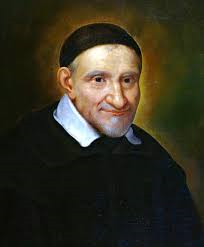The life of Saint Vincent de Paul (1581 – 1660) – he always signed his name ‘Depaul’, perhaps so people would not think him of noble stock – spans a fractious time in France, with the wars of religion nearing their apex, mixed up with bitter claims over land and money. The instability of the kingship in France did not help matters, with the accession of a Protestant-Huguenot, Henry of Bourbon, in 1589, after the assassination of Henry III as he was besieging Paris.
But Vincent did not worry not overmuch about the ways of the great ones of this earth, even though in 1643 he ended up as confessor and spiritual adviser to Queen Anne, the widow of King Louis XIII, and helped shape the religious policies of France, especially towards the pernicious heresy of Jansenism. His life had been a colourful one to that point: From peasant stock, his father sold their oxen to pay for his seminary education, and Vincent, bright and intelligent, if given to irascibility, was ordained in 1600 at the tender age of nineteen, expecting a relatively comfortable life of an urban, and urbane, parish priest. However, he was captured by pirates, and spent two years as a slave, moved hither and yon, even out to Istanbul, where he helped convert an apostate priest who had converted to Islam and taken three wives. (Some historians dispute this ‘slave episode’ in Vincent’s life, but it seems true).
Gradually, Vincent realized there was more to the priesthood than he had realized, not least after hearing the confession of a dying peasant in 1612, which made him aware of the plight of the innumerable poor. His profound spiritual gifts recognized, he was ‘in demand’ with the great ones of the earth. But Vincent, began to focus more and more of his priestly ministry on those ‘on the margins’, as it is now said; and there were many in those days, with taxes squeezed out of a bleeding people, costly nationalistic and mostly futile wars, and what wealth there was ever-more concentrated in governmental coffers in Versailles. Vincent founded two Orders, the Daughters of Charity and the Congregation of the Mission, which continue his work for the poor throughout the world to this day.
Charity is certainly greater than any rule. Moreover, all rules must lead to charity. Since she is a noble mistress, we must do whatever she commands. With renewed devotion, then, we must serve the poor, especially outcasts and beggars. They have been given to us as our masters and patrons.
Monsieur Vincent became renowned for his simple holiness, always giving, and ever-more forgetful of self. He died on this day, September 27th, 1660, and canonized by Pope Clement XII in 1737. His heart remains incorrupt.
One anecdote of Saint Vincent that sticks in my mind is a promise he made always to say the more simple and direct thing, rather than the obfuscatory, ambiguous circumlocutions most of us use to avoid telling someone what may be an uncomfortable truth, but to which they have a right. Providential, perhaps, that this is also the day in 1968 that the bishops of Canada released their infamous ‘Winnipeg Statement’, which more or less allowed Catholics to follow whatever path ‘seemed good to them in their conscience’, in response to Pope Paul VI’s encyclical Humanae Vitae, which clearly and in no uncertain terms condemned the intrinsic evil of contraception.
We could use more such clarity and precision, both amongst, and to, the ‘great ones’ of this world. A few more bold and forthright, as well as charitable and joyful, Vincent de Paul’s would do the word a whole lot of good.
Ora pro nobis, Monsieur Vincent!


